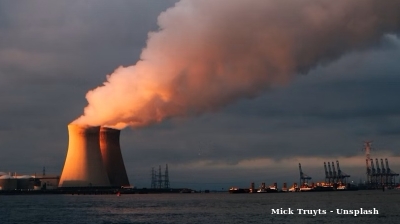The posters announcing Kazakhstan’s Sunday October 6 nuclear power plant referendum have been going up since early September. After more than 30 years of hesitation over whether or not to broach the issue of civil nuclear energy with a nervous public, President Kassym-Jomart Tokayev, who succeeded Nursultan Nazarbayev in 2019, finally bit the bullet and put the subject squarely on the table last year.
“Kazakhstan should have its own nuclear power plant,” Tokayev declared, before announcing the popular vote.
The country has since been through a year of public consultations on the advisability of building a nuclear power plant, or NPP. Every city in the country has put on such an event.
The first forum, however, took place in August last year in the small fishing village of Ulken, the very place where—should the referendum vote produce a “Yes”—two 1,200-to-1,400-megawatt pressurised NPP water reactors will be built over a period of eight to 10 years.
Located 330 kilometres (205 miles) north of Kazakhstan’s biggest city and commercial capital Almaty, on the southern shore of the country's largest lake, Balkhash, Ulken has a population of around 3,000. Countless of its buildings stand deserted, with three-quarters of the village’s former inhabitants having left following the fall of the Soviet Union around three and a half decades ago.
Three kilometres from Ulken is a checkpoint, behind which is the planned site for the nuclear plant (Credit: Emma Collet).
Interestingly, ask one of the present-day older inhabitants of Ulker about energy issues and they might recall how as long ago as the 1980s, the villagers were anticipating the building of a large hydropower plant by their village.The project was abandoned when the Soviet Union collapsed.
The locals, apart from the fishermen who fear their fish will be imperilled by the NPP, largely seem delighted by the prospect of hosting a nuclear power facility. “The majority of us here are in favour. For 30 years, people have been hoping for the construction of a power plant to revitalise their locality, which today resembles a ghost town,” says Tokakhtan Aliev, manager of the small engineering company Balkhach Energy.
“This [power facility] will attract work and new investments,” considers Kenzhemurat Kesenov, the optimistic mayor of Ulken. Last year, Kesenov welcomed experts from the International Atomic Energy Agency (IAEA), the watchdog that will supervise any approved construction and carry out regular checks.
The president, Kassym Jomart-Tokayev, says the NPP could be transformational for the nation as it would underpin plans for economic growth (Credit: Akorda).
The Tokayev administration has been running a “Yes” campaign that comes across as billing the nuclear project as the most “patriotic” ever.
“In view of the growing global energy deficit, we urgently need reliable, environmentally friendly energy sources”, the president lately insisted to lawmakers in parliament, stating that nuclear power “is capable of largely satisfying the rapidly growing [energy] needs of our economy”.
Though it is yet to venture into nuclear power, Kazakhstan, Central Asia’s biggest economy, is as it happens the world's leading producer of nuclear fuel feedstock uranium, accounting for 40% of global uranium production. Some 70% of its electricity is still generated by coal-fired power plants, dilapidated infrastructure that regularly breaks down, causing misery with major energy outages every year.
“Southern Kazakhstan, in particular, is experiencing significant electricity shortages,” says Jakyp Khairushev, an engineer and director of the country’s National Chamber of Entrepreneurs, or Atameken. “And this [difficulty] will increase over the years due to growing urbanisation and population growth, not to mention the new industrial developments taking place there. A nuclear power plant will bring a certain stabilisation. Although, in reality, we'd have to build three to be really effective.”
Experts expect Kazakhstan's electricity demand to reach 153bn kWh by 2035, with energy ministry calculations showing electricity use likely to increase by an average of 3% per year. But while the government may have basic mathematics on its side, heated debates in society on the nuclear issue continue.
Memories of 40 years of Soviet nuclear weapon testing during 1949 to 1989 are still painfully vivid in Kazakhstan. Cancer and birth defects were found to affect 488 out of every 1,000 babies in the test zone in the late 1990s and health impairments related to the testing are still discovered among the population of the region today. The ecology of this part of the country is, meanwhile, seen as a shambles. The idea of a Fukushima of Chernobyl-type nuclear disaster occurring in Kazakhstan terrifies many Kazakhs into reliving the dark past.
Coming soon to Kazakhstan? Scene in Akkuyu on the Mediterranean coast, where Rosatom is a couple of years behind schedule in constructing Turkey's first NPP (Credit: Rosatom).
Those pushing for a “No” vote claim there is no need to turn to nuclear power in the quest to secure Kazakhstan’s energy future. As part of their alternative vision, the government, they say, could start with with the renovation of existing electricity generation infrastructure. Around 65% of the country’s power plant equipment has been in service for more than 20 years, with 15% of electricity lost due to antiquated transmission networks.
One of the most important voices of the opposition to the NPP is that of Aset Nauryzbaiev. A former boss of Kazakhstan Electricity Grid Operating Company (KEGOS) he contends that “significant development of renewable energies such as wind and solar power would be the solution, and six times cheaper than nuclear energy!”
An independent economist and member of the “AES kerek emes” collective (“An NPP is not compulsory”), Nauryzbaiev is concerned by the lack of available information on proposed radioactive waste storage plans, as well as a general lack of clarity regarding the financing of the $12bn nuclear project and the likely foreign general contractor for the plant.
France’s EDF, South Korea’s KHNP, China’s CNNC and Russia’s Rosatom are contenders for the contract to construct the NPP.
Short odds can be had on Rosatom winning the deal, given former Soviet Kazakhstan’s links to its northern neighbour, in terms of geopolitics, energy and uranium mining and processing, among other areas.
The Kremlin's expanded nuclear diplomacy has been increasingly directed at Central Asia this year, among other parts of the world. Rosatom already has the commission to build Central Asia’s first NPP, in Uzbekistan—a deal signed in Tashkent during a visit from Vladimir Putin—and it is pushing hard to build a nuclear facility in Kyrgyzstan.
“In the 2000s, when the construction of a nuclear power plant was mooted, there was absolutely no debate about who was going to build it – everyone naturally thought it would be Russia. But the issue has become eminently political since 2014 and the annexation of Crimea [by Russia from Ukraine], and even more so since the [outbreak of the] large-scale war in Ukraine,” observes Dauren Aben, a Kazakh expert on nuclear safety, who now directs the international department of Kazakhstan’s Institute for Strategic Studies, a government-affiliated think tank.
If Kazakhstan does not select Rosatom, Moscow might take it as a pointed affront in the heart of its sphere of influence. With the Kazakhs still highly economically reliant on their links with Russia, they remain wary of serious setbacks in their relationship with Russia.
It is impossible to say how representative the opposition to the NPP is of the 20mn-strong Kazakh population. While many show indignation or indifference, a poll conducted in August by the Institute for Strategic Studies found more than half of respondents in favour of the nuclear path.
It’s not hard to find anti-nuclear activists convinced the outcome of the vote has been decided in advance. “What will the referendum on the nuclear power plant be like? Simple, just like previous votes,” wrote Asylbek Bisembaev, a political scientist opposed to the NPP, insinuating that the day at the ballot box will be tainted by irregularities.
In Almaty, anti-nuclear supporters have been organising to register to attend the ballot count. “We're going to have to prove that we've won this referendum,” says Aset Nauryzbaev, an activist convinced that there is a majority in the country opposed to the plant.
Scepticism over how genuinely reflective the referendum will be of public sentiment towards a move into nuclear power has mounted in the face of authorities putting up obstructions to public gatherings of the “No” movement. In August, anti-nuclear activist Meiirkhan Abdimanapov was arrested on a bus in Almaty as he attempted to travel to a public meeting on the nuclear solution in the capital, Astana. Last weekend, 14 activists were arrested in Almaty before they could demonstrate their opposition to the nuclear project. Five, charged with plotting mass unrest, have been placed in pre-trial detention for at least two months. For Tokayev, attempting to unite the country behind an ambition for a secure energy future, it’s not a good look.
Features

Project Matador marks new South Korea-US nuclear collaboration
Fermi America, a private energy developer in the United States, is moving ahead with what could become one of the most significant privately financed clean energy projects globally.

CEE needs a new growth model as FDI plunges
wiiw economist Richard Grieveson says the CEE region’s long-standing model of attracting FDI through low labour costs no longer works.
KSE: Ukraine is facing a $53bn budget shortfall, but economy is stable for now
Ukraine is in urgent need of additional financing from partners as the continuation of the war drives up defence spending and reconstruction needs, jeopardizes budget financing, weighs on the balance of payments, and slows economic growth.

PANNIER: Ruling family’s ‘palace in the sky’ cruel sight for Turkmenistan’s poor souls down below
Photos posted of renovated Boeing by US makeover manager offer further insight into "ultra-luxurious" world enjoyed by Berdimuhamedovs.







